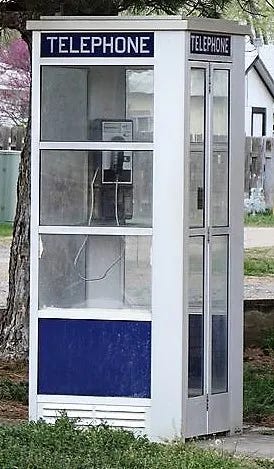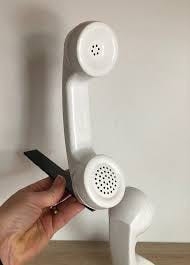Years ago, the telephone was one of my favorite parts of modern life. As odd as it seems today (even to me), I remember the anticipation I felt when it rang. You never knew who was going to call. Sure, there was always the possibility of bad news; a ringing phone after 9 pm for most people usually meant woe, sometimes of the worst kind.
But most of the time, save the ebbs and flows of telemarketer calls, it was someone you knew and probably wanted to speak to. At least, that’s how I felt about the phone during my teen years and into early adulthood, when I would often rack up bills of $200 in long distance calls to friends. This was not chump change in the 1990s.
The charm of the telephone began to wear as full and mature adulthood came along. One wants more privacy and quiet at 30 than at 20. The introduction of the answering machine, along with caller ID, made it possible to avoid both bill collectors and ex-boyfriends.
But the telephone had an important place in life, and despite its annoyances, I think most of us found it useful. And we could find it so because it had a place. There was a boundary around the telephone. It had a limited job, it did not travel with us, and it could be counted on to perform that limited job with enviable reliability by today’s standards.
Calls on copper wire were so clear and easy to understand, almost all of the time. Dropped calls , or crossed wires with their ghostly, whispered conversation between two strangers playing at a level just loud enough to detect but not to understand, were so rare that they were told as party anecdotes. “Can you hear me now?” was not part of the lexicon, because it did not need to be. Say what you will about Ma Bell, but she delivered what she promised.
Now, I dread the phone. I resent its nagging rings, dings, and chimes. Because it’s not a telephone, is it? It’s a computer, it’s a walkie-talkie, it’s a self-aware calendar. As modern business practices have become permanently customer-hostile, it’s more often than not a required device companies force you to use (oh, no, they won’t speak to you on it) to communicate with them. Through an app, naturally; whether it’s convenient or even possible for you matters nothing to them.
Modern “phones” do not serve our needs. We serve the phone’s demands, which are, in turn, the demands of Apple, Google, Key Bank, my dentist’s office, the grocery store. I expect soon to be required to check in on the app before visiting my grandmother’s grave.
(Sidenote: do you remember a time when it didn’t make sense to speak of the demands that companies made on their customers? It swivels my head around to contemplate how quickly it’s become New Normal that we customers obey the convenience and dictates of companies we pay lest they fire us.)
It is at this point in the essay when, I know, some may be tooling up the “well, actually’s”. Let me try to dispense with those quickly. Yes. I recognize that we can do So Many More Things! with modern phones. I also recognize that as technologies evolve, trade-offs occur.
Stipulated. But I don’t care. I don’t like the balance of this trade-off. It doesn’t seem to have come from an honest interplay between customer demand and business innovation. It feels more like forced compliance without even the pro-forma pretense companies used to deploy to at least seem as though they valued what their paying customers told them they needed and wanted.
Let’s put down the thread of technology and pick up the subject of the human (mis)behavior that has evolved alongside it.
This is a telephone booth. No, it’s not a “pay phone.” I mean, yes, it is a pay phone, but the pay-to-use phone is not what I’m concerned with. It is the booth I am pointing to.
Why did we have phone booths? Because we had manners. Because we recognized the difference between public and private life. Because we had boundaries.
We have none of these anymore, and nowhere does that lack draw more attention to itself than through the public behavior of modern “phone” users. Ten years ago I would have complained about the poor manners of the very young or the very . . . urban. Today even the baby boomers have forgotten everything they used to know about how to behave with decency and consideration when a “phone” is involved.
When I am in public and I receive a call I cannot put off, the same instincts kick in for me that have always been there. I find a corner to duck into, or I go outside the store to find a place out of the way. I do this to respect the privacy of my caller, to respect my own privacy, and to be considerate of passersby.
I “find a phone booth.”
Not so most everyone else. It is now de rigeur for the average American of any social or economic class to lollygag down the aisles of Shure-Save with her phone held out like a Denny’s breakfast platter with the “speakerphone” feature activated. We are compelled to learn about her plans for dinner, to hear his argument over the brand of butter to be bought, or to hear about how babydaddy and babymama hate each other almost as much as they hate their children.
And more, it’s not just how people comport themselves when they’re in public among strangers. It’s also how we have begun to treat our colleagues, acquaintances, business contacts, and friends.
A social media mutual recently recounted how disturbed she is when she “gets that feeling” that she needs to stop talking in the middle of a phone conversation to ask, “Did you put me on speakerphone?” It’s shocking that this feeling occurs. It’s more shocking that there’s a reason for that feeling: Modern phone users do, in fact, increasingly think nothing of putting one on speakerphone without informing the other party, and without the other party’s consent.
This behavior is such a reversal of everything I grew to understand as basic unthinking decency and consideration that I almost disbelieve I’m writing about it. Can this be real? It can.
What has happened to us? Whither our theory of mind, or in modern parlance, our “empathy”? The thought of just putting a conversational partner’s voice out onto a speaker in public, or in front of people who are strangers to that party—I can’t grasp it. Just imagining it makes me crawl with embarrassment and guilt. How many of us have unknowingly announced our miscarriages, bankruptcies, or incontinence to a room full of strangers?
One of the things I most appreciate that Kevin (the other half of Disaffected) does is how he immediately announces when he’s answered my call on his phone in the car, and that “Bill” or “Tina” are there. This is manners in action. It alerts his caller that he cannot talk privately, and without making a direct announcement that would embarrass anyone, allows his caller to quickly discern whether to continue talking in front of Bill or Tina.
This should be universal, default behavior, but it is not.
Leave aside the question of public/private boundaries for a moment. The speakerphone feature itself causes private problems. It’s simple physics. When you use speakerphone, the combination of your mouth’s distance from the microphone and the 1878-call-quality of modern cell reception makes it impossible to parse much of any phone call. Much of the time, I just can’t hear the other party well if he chooses to use speakerphone.
That is not because I’m hard of hearing (I’m not). It is because I am a human. Telephones were originally designed for humans. They are not now. Look at this picture:
That is a classic telephone receiver/transmitter handset. It barely changed from the 1930s to the 1990s. It was built this way to accommodate—wait for the shock twist—the human ears that would employ it. It was shaped to feel comfortable on the ear, and to muffle ambient noise so that the call could be heard.
Compare this to a modern cell phone’s three-millimeter speaker square set into a rectangle that not only doesn’t muffle ambient noise but that also hurts the ear by forcing it up against the hard ridge of the phone’s outer casing.
It is difficult enough to hear and understand a caller over cell transmission without the added obstacle of speakerphone.
Here are my pleas to modern phone users. These are practices I use myself:
1. Never put your caller on speakerphone in public without asking his explicit permission, or otherwise indicating that his voice can be heard by others. Actually, never conduct calls on speakerphone in public. Ever.
2. Ask your caller if she can hear and understand you. Just this small courtesy would go so far. Yet one almost never gets it.
3. Because I am aware that speakerphone or receiver/transmitter earbuds can make voice calls harder for the recipient, I always alert them and ask, once I’ve activated the feature, if they are still able to understand me.
4. Remember your manners. Think about the needs and comfort of the people whose time you are asking for with a phone call.
5. Stop acting like a cow in public. Turn off that speakerphone; put the platter away. Nobody needs or wants to hear about your grocery list, insurance quote, or drunken indiscretion.
Should have just titled this essay Josh Tilts At Windmills: Episode 1,564, eh?
PS—If you’re still with me, thank you for reading this! If you enjoyed it (even perversely), would you consider buying a paid subscription? Your purchase helps more than just me personally. This Substack is the main way that our weekly show, Disaffected, gets produced. Kevin and I don’t have sponsors, we only have our audience to help support our work.





It’s not a phone. It’s a tracking and behavior modification device.
I'm HELLA freaked out now. Because of my hearing situation I hear all calls the same way and my assumption if anything sounds or feels "off" is always that it's an issue on my end. But what you said about Kevin announcing when others are around made me realize that such behavior apparently isn't normal, as it's noteworthy. Oh. My. God. I rarely call people but if I do, it's usually important and/or upsetting. Now I'm wondering how many times I've been on speaker and spilling personal matters to strangers in the grocery store or friends' spouses and children.